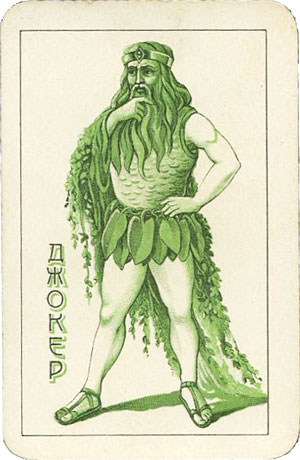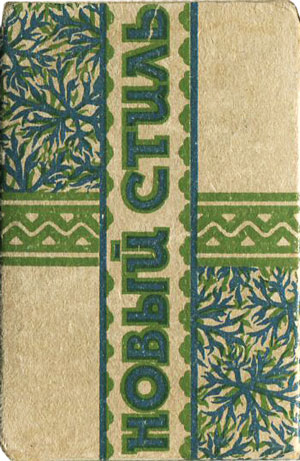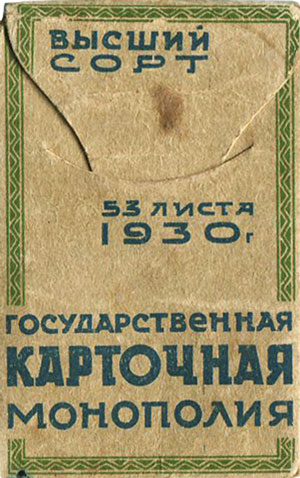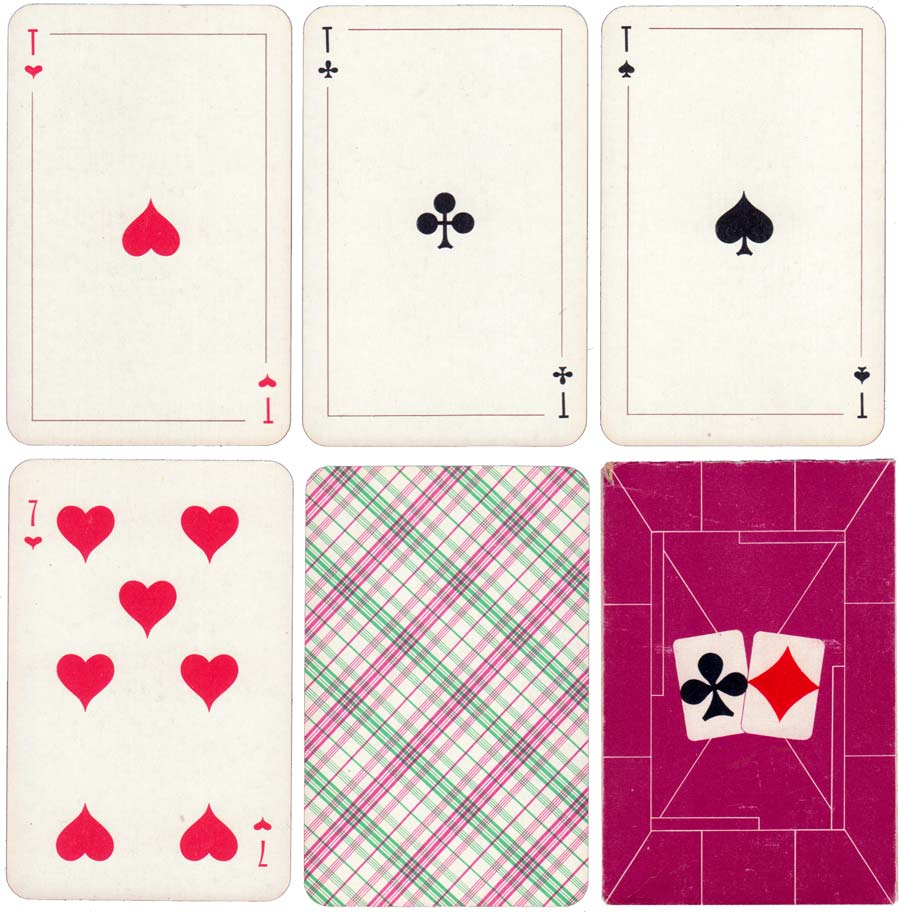New Style ‘Jugendstil’
Playing cards showing the influence of ‘Jugendstil’ manufactured by the Soviet Playing Card Monopoly (U.S.S.R.).
“New Style”
playing cards from Russia based on Literature & Theatre
Playing cards showing the influence of ‘Jugendstil’ first manufactured by the Soviet Playing Card Monopoly (U.S.S.R.) in 1911 and then again in c.1930. The well-designed court figures are colour coordinated, and represent characters taken from literary works, pantomimes and comedy (Queen of Diamonds as Scheherazade, Queen of Clubs as a mermaid, Knave of Hearts as Pierrot). Some editions are known with English indices suggesting that the cards were also intended for export.

Above: the original Joker from the first edition.


Above: the box (front & back) from 1930s edition.
Click here to see the original back design.

Above: cards from a modern re-print, c.1980, with a new back design and box. Images courtesy Rex Pitts.

By Rex Pitts (1940-2021)
Member since January 30, 2009
Rex's main interest was in card games, because, he said, they were cheap and easy to get hold of in his early days of collecting. He is well known for his extensive knowledge of Pepys games and his book is on the bookshelves of many.
His other interest was non-standard playing cards. He also had collections of sheet music, music CDs, models of London buses, London Transport timetables and maps and other objects that intrigued him.
Rex had a chequered career at school. He was expelled twice, on one occasion for smoking! Despite this he trained as a radio engineer and worked for the BBC in the World Service.
Later he moved into sales and worked for a firm that made all kinds of packaging, a job he enjoyed until his retirement. He became an expert on boxes and would always investigate those that held his cards. He could always recognize a box made for Pepys, which were the same as those of Alf Cooke’s Universal Playing Card Company, who printed the card games. This interest changed into an ability to make and mend boxes, which he did with great dexterity. He loved this kind of handicraft work.
His dexterity of hand and eye soon led to his making card games of his own design. He spent hours and hours carefully cutting them out and colouring them by hand.
Related Articles

Scientific Whist
“Scientific Whist” : standard cards with instructions for play on the faces by Chas Goodall & Son, 1...

Danao Tiāngōng Puke
Children’s playing cards based on the 1961 Chinese animated feature film 大闹天宫 (Havoc in Heaven).

Agatha Christie and Playing Cards revisited
Agatha Christie uses card-play as a primary focus of a story, and as a way of creating plots and mot...

Doppel-Deutsche Karten by Bratří Willnerové, Teplice
This deck from local manufacturer Bratří Willnerová offers a standard version of the popular Central...

International pattern from Russia
Colourful international pattern cards from Russia sold in Latvia.

Whist by Ditha Moser
Ditha Moser created this minimalist Whist deck in 1905, in the style of the Vienna Secession art mov...

Beowulf
Jackson Robinson's Beowulf playing card deck inspired by the Old English pagan poem.

Egyptium
“Egyptium” is a hand-illustrated deck of fantasy playing cards with artwork by Russian artist Oleg S...

Alan Tarot Deck
Reprint of a Tarock pack originally designed by Argio Orell for the Austrian Lloyd shipping company....

2011 Worshipful Company Pack
Celebrating the bicentenary of the birth of Charles Dickens, with characters adapted from drawings b...

Jeu Philatélique
Cards with French postage stamps featuring famous literary figures.

Russian Circus deck
The Russian Circus deck published by the Imperial Playing Card Factory, St Petersburg.

Historical Characters
Double-ended deck with historical characters and jacks as jesters by Daveluy, c.1850.

Victor Hugo 1885-1985
Characters from novels by Victor Hugo marking the centenary of his death, as conceived by Dominique...

Victor Hugo “L’homme qui rit”
Two different packs with costume designs for Victor Hugo plays, issued on the centenary of his deat...

Pinocchio playing cards
Comic book drawings inspired by Carlo Collodi’s children’s classic, Pinocchio.
Most Popular
Our top articles from the past 28 days





